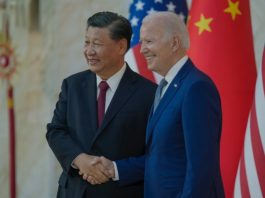(The Center Square) – Oilprice.com, a primary source for oil and energy news, warns that a Joe Biden presidency would cause a “huge new oil glut” because of his policies with Iran. An official from Bahrain, an Islamic country that recently signed a peace deal with Israel and the U.S., warned that a Biden win could jeopardize peace deals in the Middle East in addition to flooding the market with oil.
“As if the oil market needed another uncertainty in the year of the pandemic, a Joe Biden win at next week’s U.S. presidential election could have a significant impact not only on the American oil industry but also on global crude supply within a year,” Tsvetana Paraskova, at Oilprice.com, argues.
In an op-ed published by CNN in September, Biden made clear his position: “There’s a smarter way to be tough on Iran” than President Trump’s hard line on the Islamic Republic.
“I will offer Tehran a credible path back to diplomacy. If Iran returns to strict compliance with the nuclear deal, the United States would rejoin the agreement as a starting point for follow-on negotiations. With our allies, we will work to strengthen and extend the nuclear deal’s provisions, while also addressing other issues of concern.”
Last month, Biden also pledged to phase out oil and gas production in the U.S., which drew criticism from many U.S. leaders, including Texas Gov. Greg Abbott, who represents the largest crude producing state in the U.S.
“Using oil sanctions relief as a bargaining tool in 2021 is a bad idea because of how other regional exporters will react,” Karen Young at the American Enterprise Institute told Bloomberg News when discussing Biden’s approach, which is the opposite of President Donald Trump’s.
Last week, the U.S. Treasury Department imposed additional sanctions on Iranian actors, including the Iranian minister of petroleum, the National Iranian Oil Company, and National Iranian Tanker Company and individuals and entities. It also froze any U.S. assets of those blacklisted and banned all Americans from having any dealing with them.
Those blacklisted allegedly support the Quds Force, an elite foreign paramilitary and espionage arm of the Islamic Revolutionary Guard Corps, the Treasury Department argues.
“The regime in Iran uses the petroleum sector to fund the destabilizing activities of the IRGC-QF,” Treasury Secretary Steven Mnuchin said in the statement.
Paraskova argues that a Biden presidency would result in lessening the sanctions on Iran’s oil exports, which could potentially pave the way “for around two million barrels per day (bpd) of Iranian crude oil exports returning to the market.” The market would be too weak to handle the influx, as global oil consumption is not expected to return to pre-pandemic levels until at least the end of 2021, she notes.
Ariel Kahana and Daniel Siryoti write in Israel Hayom that the Gulf States “want to create a diplomatic-security bloc against Iran under the patronage of President Donald Trump.”
A Bahrain diplomat told the Hebrew language paper that a Trump victory would result in a “flood of moderate Arab and Muslim countries” signing peace agreements.
A Biden victory wouldn’t endanger the recently ratified deals with the United Arab Emirates and Bahrain, but “a Biden victory will see many of the countries that are currently exploring the possibility of normalizing relations [with Israel] take a step back and revisit the risk they are taking.”
Mossad director Yossi Cohen told The Jerusalem Post last month that a normalization agreement between Jerusalem and Riyadh was imminent and likely to be confirmed after the election, if Trump wins. A deal could still be possible if Biden won, he said, but it would take longer.
By Bethany Blankley | The Center Square
Go to Source
Reposted with permission









